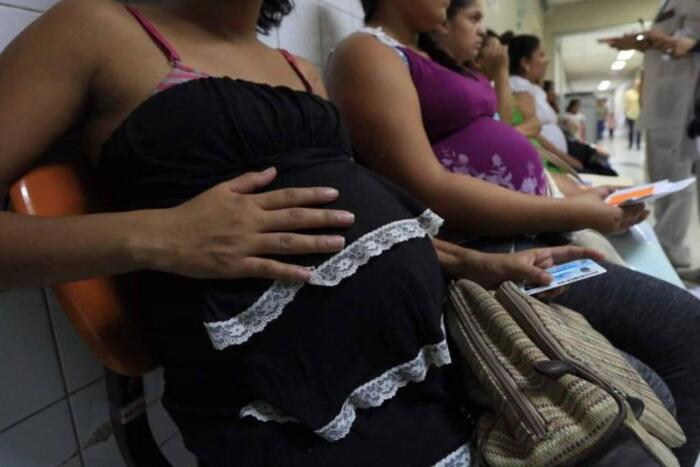This is the web version of Americanas, the EL PAÍS America newsletter that addresses news and ideas with a gender perspective.
To receive it every Sunday you can subscribe
at this link
.
Every year, thousands of women from all over Latin America suffer obstetric violence.
They are mistreated during pregnancy and/or childbirth, they are denied treatment or are subjected to medical interventions against their will, such as caesarean sections.
The laws of some countries regulate this type of violence against women, but even so it is still very invisible and there is a lack of information campaigns to prevent it.
This week, a ruling by the Inter-American Court of Human Rights against Argentina (IACHR Court) marked a historic milestone in the fight of women's organizations against this type of violence.
The Court held the Argentine State responsible for violating "the right to life, personal integrity and health" of Cristina Brítez Arce, a 38-year-old woman who died on June 1, 1992 in the Ramón Sardá public maternity hospital in Buenos Aires. Aires.
The judges considered that her pregnancy had risk factors that were not adequately addressed by the Argentine health system.
Brítez Arce went to the hospital due to fever and lumbar discomfort related to her pregnancy.
When the professionals on duty performed an ultrasound, they determined that her fetus was dead and admitted her to induce labor.
That same day, at six in the evening, the pregnant woman died of "non-traumatic cardiorespiratory arrest."
This is the first time that this court has established that obstetric violence is a form of gender violence prohibited by the Inter-American Convention to prevent, punish and eradicate violence against women, better known as the Belem Do Pará Convention.
"The decision of the Court in the Brítez case calls for transforming practices, regulations, decrees, and laws that facilitate or do not prevent obstetric violence, and many public policies must be promoted to materialize these standards developed by the Inter-American Court," says Carmen Cecilia Martínez, associate director of legal strategies at the Center for Reproductive Rights (CDR) for Latin America and the Caribbean.
This organization trusts that the ruling will help curb these illegal practices and allow other victims to get justice, as in the case of the Peruvian Eulogia Guzmán and her son Sergio, also admitted by the Inter-American Court.
Guzmán is a Quechua woman who lives in a peasant community in Peru.
She gave birth to her first children at home according to her will and customs, but in 2003, on the day of the delivery of her sixth child, medical personnel forced her to go to a health center, threatening to impose fines, according to her testimony. .
During her labor, a nurse prevented her from giving birth squatting on the floor as she had always done and forced her to climb onto the bed.
During the struggle, her son Sergio was born and hit the floor on the head, which caused serious health complications that led to his death at the age of 12.
The cases of obstetric violence that reach the courts are minimal and there are also few that gain public relevance.
In Brazil, one of the most notorious was that of Adelir Lemos de Goes, 29 years old.
In 2014, De Goes wanted to have her third child vaginally after having undergone two C-sections in her previous deliveries.
When she was in full labor at her home in the rural municipality of Torres, she was taken from there by armed police and a judicial officer and forced into an ambulance that took her to a hospital.
There she was anesthetized and submitted to a surgical intervention to which she opposed.
Doctors forced her to give birth by caesarean section because the baby was breech, but women's rights groups denounced what happened as an attack on women's autonomy.
In 2019, the United Nations made visible the existence of obstetric violence in its report Human rights-based approach to abuse and violence against women in reproductive health services, with special emphasis on delivery care and obstetric violence.
In the document, the international organization pointed out that a caesarean section performed "without the consent of the woman, can constitute gender-based violence against women, and even torture."
In 2007, Venezuela became the first country to have a specific law to deal with obstetric violence.
In 2007 Argentina joined and later Panama, some Mexican states, Bolivia and El Salvador followed.
Even so, this type of violence is far from being eradicated.
These are our recommended articles of the week:
And a suggestion to finish:
👩🚀 A story about women in space:
This week, one of the chapters of Hoy in EL PAÍS, our daily podcast that explains the news and analyzes current affairs, had a jewel in store.
It was in the conversation this Friday between Ana Fuentes and Javier Salas, a colleague from MATERIA, the Science section of the newspaper, in which they reviewed some of the space achievements of 2022 and the projects expected for this year.
In the middle of the talk, the topic of women in space came up and Javier Salas gave a brief review of this interesting story that he knew well.
This probably won't surprise anyone, but astronauts faced a lot of prejudice and barriers.
In addition, these pioneers had to listen to unpleasant comments.
For example, the second woman to go into space, Svetlana Savitskaya, was greeted in an apron and told that the kitchen was in the back.
Another astronaut, Sally Ride, was asked by her colleagues if 100 tampons were enough for six days away from Earth.
Salas had told that story in this article in 2017 that is worth reading (or rereading, if they already did so at the time).



/cloudfront-eu-central-1.images.arcpublishing.com/prisa/2BJPLFOPENCKDMK6PPADXUU37E.jpg)




/cloudfront-eu-central-1.images.arcpublishing.com/prisa/RHYRDMQQ7BG5JOUSKAXBLKE6YE.jpg)
/cloudfront-eu-central-1.images.arcpublishing.com/prisa/ETGSMPG4ZNFJFFLVSLKB3DWPSQ.jpg)





